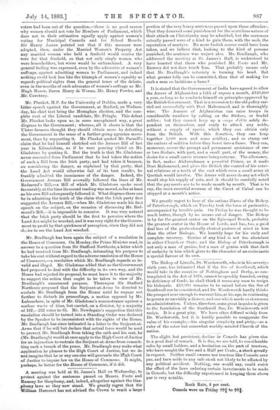Mr. Bradlaugh has been again the subject of a resolution
in t he House of Commons. On Monday, the Prime Minister read, in answer to a question from Sir Stafford Northcote, a letter which be had received from Mr. Bradlaugh, intimating his purpose to
t ake his seat without regard to the adverse resolution of the House of Commons,—a resolution which Mr. Bradlangh regards as in- -valid and illegal. Mr. Gladstone added that as the Government had proposed to deal with the difficulty in its own way, and the House had rejected its proposal, he must leave it to the majority to suggest the action that ought to be taken in view of Mr. Bradlaugh's announced purpose. Thereupon Sir Stafford Northcote proposed that the Serjeant-at-Arms be directed to -exclude Ht.-Bradlaugh from the House until he engage not further to disturb its proceedings, a motion opposed by Mr. Labouchere, in spite of Mr. Gladstone's remonstrance against a useless waste of time, but carried, on a division, by a majority of 167,-232 votes to 65. Mr. Newdegate's suggestion that this esolution should be turned into a Standing Order was declared by the Speaker to be inconsistent with the rights of the House. Mr. Bradlaugh has since intimated in a letter to the Serjeant-at- Arms that if he will but declare that actual force would be used -to prevent Mr. Bradlangh from taking the oath and his seat, he :(Mr. Bradlaugh) would at once apply to the High Court of Justice for an injunction to restrain the Serjeant-at-Arms from commit- ting such a breach of the peace. Mr. Bradlaugh may make what .application he pleases to the High Court of Justice, but we do slot imagine that he or any one else will persuade the High Court of Justice to impose law on the House of Commons. It might, perhaps, be better for the House of Commons, if it did.


































 Previous page
Previous page